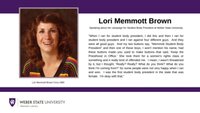| Title |
Brown, Lori Memmott OH19_007 |
| Creator |
Weber State University, Stewart Library: Oral History Program. |
| Contributors |
Brown, Lori Memmott, Interviewee; Harris, Kandice, Interviewer; Stokes, Alexis, Video Technician |
| Description |
The Beyond Suffrage Project was initiated to examine the impact women have had on northern Utah. Weber State University explored and documented women past and present who have influenced the history of the community, the development of education, and are bringing the area forward for the next generation. The project looked at how the 19th Amendment gave women a voice and representation, and was the catalyst for the way women became involved in the progress of the local area. The project examines the 50 years (1870-1920) before the amendment, the decades to follow and how women are making history today. |
| Abstract |
The following is an oral history interview with Lori Memmott Brown, conducted on August 28, 2019 in the Stewart Library's Archives Conference Room, by Kandice Harris. Lori discusses her life, her memories at Weber State University, and the impact of the 19th Amendment. Alexis Stokes, the video technician, is also present during this interview.; The following is an audio clip of an oral history with Lori Memmott Brown, conducted on August 28, 2019, by Kandice Harris. In this clip, Lori describes one experience while running for student body president at Weber State University. |
| Subject |
Voting--United States; Women--suffrage; Women--Rights of women; Universities and colleges; Women in higher education; Educational leadership; Elections; Student government--Elections |
| Keywords |
Female student body presidents; Female leaders; Female student leaders |
| Digital Publisher |
Stewart Library, Weber State University, Ogden, Utah, United States of America |
| Date |
2019 |
| Date Digital |
2019 |
| Temporal Coverage |
1960; 1961; 1962; 1963; 1964; 1965; 1966; 1967; 1968; 1969; 1970; 1971; 1972; 1973; 1974; 1975; 1976; 1977; 1978; 1979; 1980; 1981; 1982; 1983; 1984; 1985; 1986; 1987; 1988; 1989; 1990; 1991; 1992; 1993; 1994; 1995; 1996; 1997; 1998; 1999; 2000; 2001; 2002; 2003; 2004; 2005; 2006; 2007; 2008; 2009; 2010; 2011; 2012; 2013; 2014; 2015; 2016; 2017; 2018; 2019 |
| Medium |
oral histories (literary genre) |
| Spatial Coverage |
Spanish Fork, Utah, Utah, United States, http://sws.geonames.org/5781860, 40.11496, -111.65492; Provo Utah, Utah, United States, http://sws.geonames.org/5780026, 40.23384, -111.65853; Ogden, Weber County, Utah, United States, http://sws.geonames.org/11788968, 41.22809, -111.96766 |
| Type |
Text; Image/StillImage; Image/MovingImage |
| Access Extent |
PDF is 52 pages; Video Clip is an mp4 file, 60.8 MB |
| Conversion Specifications |
Filmed using a Sony HDR-CX430V digital video camera. Sound was recorded with a Sony ECM-AW3(T) Bluetooth microphone. Transcribed using Express Scribe Transcription Software Pro 6.10 Copyright NCH Software. |
| Language |
eng |
| Rights |
Materials may be used for non-profit and educational purposes, please credit University Archives; Weber State University |
| Source |
Brown, Lori Memmott OH19_007 Weber State University Archives |
| Format |
application/pdf; video/mp4 |
| ARK |
ark:/87278/s678asb5 |
| Setname |
wsu_bs_oh |
| ID |
105419 |
| Reference URL |
https://digital.weber.edu/ark:/87278/s678asb5 |
| Title |
Brown, Lori Memmott OH19_007 |
| Creator |
Weber State University, Stewart Library: Oral History Program. |
| Contributors |
Brown, Lori Memmott, Interviewee; Harris, Kandice, Interviewer; Stokes, Alexis, Video Technician |
| Description |
The Beyond Suffrage Project was initiated to examine the impact women have had on northern Utah. Weber State University explored and documented women past and present who have influenced the history of the community, the development of education, and are bringing the area forward for the next generation. The project looked at how the 19th Amendment gave women a voice and representation, and was the catalyst for the way women became involved in the progress of the local area. The project examines the 50 years (1870-1920) before the amendment, the decades to follow and how women are making history today. |
| Abstract |
The following is an oral history interview with Lori Memmott Brown, conducted on August 28, 2019 in the Stewart Library's Archives Conference Room, by Kandice Harris. Lori discusses her life, her memories at Weber State University, and the impact of the 19th Amendment. Alexis Stokes, the video technician, is also present during this interview. |
| Image Captions |
Lori Memmott Brown Circa 1980 |
| Subject |
Voting--United States; Women--suffrage; Women--Rights of women; Universities and colleges; Women in higher education; Educational leadership; Elections; Student government--Elections |
| Keywords |
Female student body presidents; Female leaders; Female student leaders |
| Digital Publisher |
Stewart Library, Weber State University, Ogden, Utah, United States of America |
| Date Digital |
2019 |
| Temporal Coverage |
1960; 1961; 1962; 1963; 1964; 1965; 1966; 1967; 1968; 1969; 1970; 1971; 1972; 1973; 1974; 1975; 1976; 1977; 1978; 1979; 1980; 1981; 1982; 1983; 1984; 1985; 1986; 1987; 1988; 1989; 1990; 1991; 1992; 1993; 1994; 1995; 1996; 1997; 1998; 1999; 2000; 2001; 2002; 2003; 2004; 2005; 2006; 2007; 2008; 2009; 2010; 2011; 2012; 2013; 2014; 2015; 2016; 2017; 2018; 2019 |
| Medium |
oral histories (literary genre) |
| Spatial Coverage |
Spanish Fork, Utah, Utah, United States, http://sws.geonames.org/5781860, 40.11496, -111.65492; Provo Utah, Utah, United States, http://sws.geonames.org/5780026, 40.23384, -111.65853; Ogden, Weber County, Utah, United States, http://sws.geonames.org/11788968, 41.22809, -111.96766 |
| Type |
Text; Image/StillImage |
| Access Extent |
PDF is 52 pages |
| Language |
eng |
| Rights |
Materials may be used for non-profit and educational purposes, please credit University Archives; Weber State University |
| Source |
Brown, Lori Memmott OH19_007 Weber State University Archives |
| Format |
application/pdf |
| Setname |
wsu_bs_oh |
| ID |
105527 |
| Reference URL |
https://digital.weber.edu/ark:/87278/s678asb5/105527 |





